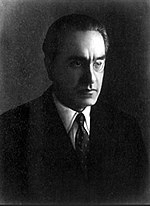How to Pronounce Julius Evola
#50
Most Popular
Boost
May 19, 1898 Rome, Lazio, Italy Died on 11 Jun 1974 (aged 76)
Italian philosopher and esotericist (1898-1974)
TaurusJulius Evola, Date of Birth, Place of Birth, Family, Facts, Age, Net Worth, Biography and More in FamedBorn.com

Italian philosopher and esotericist (1898-1974)
Taurus